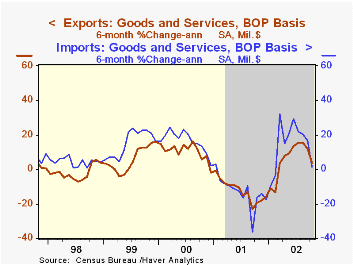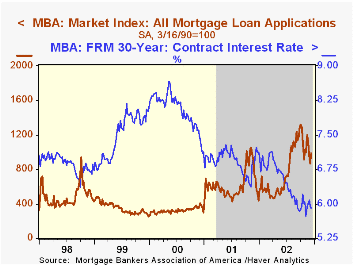 Global| Dec 18 2002
Global| Dec 18 2002U.S. Trade Deficit Improved
by:Tom Moeller
|in:Economy in Brief
Summary
The U.S. foreign trade deficit improved more than expected in October. September's deficit was revised lower due to lessened imports. Consensus expectations had been for a October deficit of $36.5B. Declines in exports and imports [...]

The U.S. foreign trade deficit improved more than expected in October. September's deficit was revised lower due to lessened imports. Consensus expectations had been for a October deficit of $36.5B. Declines in exports and imports likely were influenced by the dock workers strike.
Exports fell for the third consecutive month due to across the board component declines. Capital goods exports plunged 2.5% (5.4% AR, YTD). Exports of foods, feeds and beverages fell a hefty 4.0%, the third consecutive monthly decline. Auto exports fell for the fourth month in five. Nonauto consumer goods exports rose following two months of decline (1.1% AR, YTD).
Imports fell for the third month in four also due to across the board component declines. Capital goods imports fell a huge 6.0% (-1.7% AR, YTD), the fourth consecutive monthly decline. Imports of nonauto consumer goods also plunged, down 4.9% for the third monthly decline in four. Imports of industrial supplies and materials rose despite a decline in the refiner's acquisition cost of imported crude oil. The cost of crude oil fell to $26.74 in October from $27.14 in September.
| Foreign Trade | Oct | Sept | Y/Y | 2001 | 2000 | 1999 |
|---|---|---|---|---|---|---|
| Trade Deficit | $35.1B | $37.1B | $30.8B(10/01) | $358.3B | $378.7B | $262.2B |
| Exports - Goods & Services | -1.0% | -0.4% | 5.7% | -6.2% | 11.2% | 2.6% |
| Imports - Goods & Services | -2.4% | -1.1% | 8.0% | -6.0% | 18.3% | 10.9% |
by Tom Moeller December 18, 2002

The index of mortgage applications, compiled by the Mortgage Bankers Association, last week recovered all of the prior week's sharp decline.
Mortgage applications to refinance surged as interest rates fell for the second consecutive week.
The recent contract rate on a conventional 30 year mortgage was 5.91% versus 6.09% at the end of November.
Mortgage applications for home purchase surged and recovered most of the prior week's decline.
| MBA Mortgage Applications (3/16/90=100) | 12/13/02 | 11/08/02 | 2001 | 2000 | 1999 |
|---|---|---|---|---|---|
| Total Market Index | 985.5 | 992.3 | 625.6 | 322.7 | 352.0 |
| Purchase | 379.9 | 333.3 | 304.9 | 302.7 | 275.8 |
| Refinancing | 4,507.6 | 4,825.6 | 2,491.0 | 438.8 | 795.2 |
Tom Moeller
AuthorMore in Author Profile »Prior to joining Haver Analytics in 2000, Mr. Moeller worked as the Economist at Chancellor Capital Management from 1985 to 1999. There, he developed comprehensive economic forecasts and interpreted economic data for equity and fixed income portfolio managers. Also at Chancellor, Mr. Moeller worked as an equity analyst and was responsible for researching and rating companies in the economically sensitive automobile and housing industries for investment in Chancellor’s equity portfolio. Prior to joining Chancellor, Mr. Moeller was an Economist at Citibank from 1979 to 1984. He also analyzed pricing behavior in the metals industry for the Council on Wage and Price Stability in Washington, D.C. In 1999, Mr. Moeller received the award for most accurate forecast from the Forecasters' Club of New York. From 1990 to 1992 he was President of the New York Association for Business Economists. Mr. Moeller earned an M.B.A. in Finance from Fordham University, where he graduated in 1987. He holds a Bachelor of Arts in Economics from George Washington University.
More Economy in Brief
 Global| Feb 05 2026
Global| Feb 05 2026Charts of the Week: Balanced Policy, Resilient Data and AI Narratives
by:Andrew Cates






